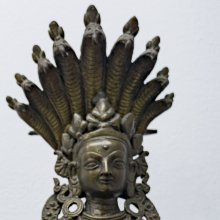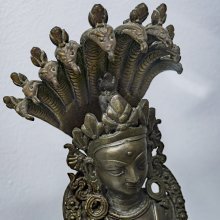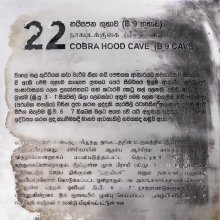Phana, Phaṇa: 20 definitions
Introduction:
Phana means something in Hinduism, Sanskrit, Buddhism, Pali, Marathi, Jainism, Prakrit, Hindi. If you want to know the exact meaning, history, etymology or English translation of this term then check out the descriptions on this page. Add your comment or reference to a book if you want to contribute to this summary article.
Alternative spellings of this word include Fan.
Images (photo gallery)
In Hinduism
Jyotisha (astronomy and astrology)
Source: Wisdom Library: Brihat Samhita by VarahamihiraPhaṇa (फण) refers to the “hoods (of serpents)”, according to the Bṛhatsaṃhitā (chapter 12), an encyclopedic Sanskrit work written by Varāhamihira mainly focusing on the science of ancient Indian astronomy astronomy (Jyotiṣa).—Accordingly, “The mighty ocean whose waters were swallowed by Agastya, exhibited gems that eclipsed the splendour of the crowns of the Devas [...] There were also seen, moving to and fro, whales, pearl oysters and conch shells, and the sea altogether looked like a summer lake with its moving waves, water lilies and swans. [...] Its huge white waves looked like clouds; its gems looked like stars; its crystals looked like the Moon; and its long bright serpents bearing gems in their hoods [i.e., phaṇi-phaṇa-upala] looked like comets and thus the whole sea looked like the sky”.

Jyotisha (ज्योतिष, jyotiṣa or jyotish) refers to ‘astronomy’ or “Vedic astrology” and represents the fifth of the six Vedangas (additional sciences to be studied along with the Vedas). Jyotisha concerns itself with the study and prediction of the movements of celestial bodies, in order to calculate the auspicious time for rituals and ceremonies.
Sports, Arts and Entertainment (wordly enjoyments)
Source: archive.org: Syainika Sastra of Rudradeva with English Translation (art)Phaṇa (फण) refers to the “hood (of a snake)”, according to the Śyainika-śāstra: a Sanskrit treatise dealing with the divisions and benefits of Hunting and Hawking, written by Rājā Rudradeva (or Candradeva) in possibly the 13th century.—Accordingly, [while discussing the yellow-eyed division of hawks]: “Of these birds, if the head is like the hood of a snake (phaṇi-phaṇa-ākāra), and if the neck is long, the wings wide and the chest broad, it is the best of its kind”.

This section covers the skills and profiencies of the Kalas (“performing arts”) and Shastras (“sciences”) involving ancient Indian traditions of sports, games, arts, entertainment, love-making and other means of wordly enjoyments. Traditionally these topics were dealt with in Sanskrit treatises explaing the philosophy and the justification of enjoying the pleasures of the senses.
Languages of India and abroad
Pali-English dictionary
Source: BuddhaSasana: Concise Pali-English Dictionaryphaṇa : (m.) the hood of a snake.
Source: Sutta: The Pali Text Society's Pali-English DictionaryPhaṇa, (cp. Epic Sk. phaṇa) the hood of a snake Vin. I, 91 (°hatthaka, with hands like a snake’s hood); J. III, 347 (patthaṭa°); DhA. III, 231 (°ṃ ukkhipitvā); IV, 133. frequent as phaṇaṃ katvā (only thus, in ger.) raising or spreading its hood, with spread hood J. II, 274; VI, 6; Vism. 399; DhA. II, 257. (Page 476)

Pali is the language of the Tipiṭaka, which is the sacred canon of Theravāda Buddhism and contains much of the Buddha’s speech. Closeley related to Sanskrit, both languages are used interchangeably between religions.
Marathi-English dictionary
Source: DDSA: The Molesworth Marathi and English Dictionaryphaṇa (फण).—m A sort of rake or harrow. Ordinarily it has four teeth. 2 A tube or channel of a drill-plough. 3 A tooth of a rake or harrow. 4 m n S The hood, esp. as expanded, of Coluber Naga.
--- OR ---
phaṇā (फणा).—f (phaṇa S) The hood of Coluber Naga. 2 m A root (as of ginger or turmeric) which sepa- rates into cloves. 3 A division of the fruitstalk of the Plantain. 4 A wooden instrument or a bamboo bowl or basket used in skimming the sugar-boiler, in scraping away the inspissated juice &c. 5 A board used in driving home the executed portion of a web, esp. of gōṇapāṭa or sacking.
--- OR ---
phana (फन).—n The tip of the plough-shaft (upon which the share is fixed); the spindle.
--- OR ---
phanā (फना) [or न्ना, nnā].—m ( A) Complete destruction or consumption; extinction or exhaustion.
Source: DDSA: The Aryabhusan school dictionary, Marathi-Englishphaṇa (फण).—m A sort of harrow. m n The hood of Nâga.
--- OR ---
phaṇā (फणा).—f The hood of Coluber Nâga. m A root (as of ginger or turmeric) which separates into cloves. A division of the fruitstalk of the Plantain.
--- OR ---
phanā (फना).—
Marathi is an Indo-European language having over 70 million native speakers people in (predominantly) Maharashtra India. Marathi, like many other Indo-Aryan languages, evolved from early forms of Prakrit, which itself is a subset of Sanskrit, one of the most ancient languages of the world.
Sanskrit dictionary
Source: DDSA: The practical Sanskrit-English dictionaryPhaṇa (फण) or Phaṇā (फणा).—[phaṇ-ac]
1) The expanded hood of a cobra or any serpent; विप्रकृतः पन्नगः फणं (viprakṛtaḥ pannagaḥ phaṇaṃ) (phaṇāṃ) कुरुते (kurute) Ś. 6.31; मणिभिः फणस्थैः (maṇibhiḥ phaṇasthaiḥ) R.13.12; Kumārasambhava 6.68; वहति भुवनश्रेणिं शेषः फणाफलकस्थिताम् (vahati bhuvanaśreṇiṃ śeṣaḥ phaṇāphalakasthitām) Bhartṛhari 2.35.
2) The expanded side of the nostril, (also phaṇam in this sense).
-ṇaḥ Ved Scum.
Derivable forms: phaṇaḥ (फणः).
Source: Cologne Digital Sanskrit Dictionaries: Edgerton Buddhist Hybrid Sanskrit DictionaryPhana (फन).—[, allegedly = Sanskrit phena, foam; cited as phaṇa once from TB. in [Boehtlingk and Roth]; Lefm. phanapiṇḍeva Lalitavistara 176.2 (verse), like a heap of foam, symbol of transitoriness; but all mss. phena°, so also citation of the line Śikṣāsamuccaya 237.11 phenapiṇḍāvad, where note says ‘scan phena-’; see § 3.65.]
Source: Cologne Digital Sanskrit Dictionaries: Shabda-Sagara Sanskrit-English DictionaryPhaṇa (फण).—mfn. Subst.
(-ṇaḥ-ṇā-ṇaṃ) The expanded hood or neck of the Cobra de capello, &c. E. phaṇ to go, aff. ac .
Source: Cologne Digital Sanskrit Dictionaries: Benfey Sanskrit-English DictionaryPhaṇa (फण).—m., and f. ṇā, The expanded hood or neck of the cobra di capello, or snake in general, [Pañcatantra] i. [distich] 107; [Śākuntala, (ed. Böhtlingk.)] [distich] 158; [Bhartṛhari, (ed. Bohlen.)] 2, 28 (ṇā).
Source: Cologne Digital Sanskrit Dictionaries: Cappeller Sanskrit-English DictionaryPhaṇa (फण).—[masculine] scum, froth; the hood of a serpent (also [feminine] ā).
Source: Cologne Digital Sanskrit Dictionaries: Monier-Williams Sanskrit-English Dictionary1) Phaṇa (फण):—[from phaṇ] m. scum, froth, [Taittirīya-brāhmaṇa] (cf. phena)
2) [v.s. ...] (also f(ā). ) the expanded side of the nose, a nostril, [Suśruta]
3) [v.s. ...] (also f(ā). ) the expanded hood or neck of a serpent ([especially] of the Coluber Nāga), [Mahābhārata; Kāvya literature] etc.
4) [v.s. ...] a stick shaped like a serpent’s hood, [Śāṅkhāyana-gṛhya-sūtra]
5) [v.s. ...] mfn. having the fingers shaped like a serpent’s hood, [cf. Lexicographers, esp. such as amarasiṃha, halāyudha, hemacandra, etc.]
6) Phaṇā (फणा):—[from phaṇ] f. of phaṇa, in [compound]
Source: Cologne Digital Sanskrit Dictionaries: Yates Sanskrit-English DictionaryPhaṇa (फण):—[(ṇaḥ-ṇā-ṇaṃ)] 1. m. f. n. The expanded hood of the cobra de capello.
Source: DDSA: Paia-sadda-mahannavo; a comprehensive Prakrit Hindi dictionary (S)Phaṇa (फण) in the Sanskrit language is related to the Prakrit words: Phaṇa, Phaṇā.
[Sanskrit to German]
Sanskrit, also spelled संस्कृतम् (saṃskṛtam), is an ancient language of India commonly seen as the grandmother of the Indo-European language family (even English!). Closely allied with Prakrit and Pali, Sanskrit is more exhaustive in both grammar and terms and has the most extensive collection of literature in the world, greatly surpassing its sister-languages Greek and Latin.
Hindi dictionary
Source: DDSA: A practical Hindi-English dictionary1) Phaṇa (फण):—(nm) the hood of a snake; ~[dhara] a snake/serpent; cobra.
2) Phana (फन) [Also spelled fan]:—(nm) see [phaṇa].
3) Phana (फन) [Also spelled fan]:—(nm) an art, craft; skill, artifice; ~[kāra] an artist; ~[maulā, hara] a master of all trades, a versatile person.
4) Phanā (फना):—(a) died, expired; ruined, destructed, devastated; (nm) death, expiry; ruin, destruction, devastation.
5) Phāna (फान):—(nm) a wedge, fillet.
...
Prakrit-English dictionary
Source: DDSA: Paia-sadda-mahannavo; a comprehensive Prakrit Hindi dictionary1) Phaṇa (फण) in the Prakrit language is related to the Sanskrit word: Phaṇa.
2) Phaṇā (फणा) also relates to the Sanskrit word: Phaṇā.
Prakrit is an ancient language closely associated with both Pali and Sanskrit. Jain literature is often composed in this language or sub-dialects, such as the Agamas and their commentaries which are written in Ardhamagadhi and Maharashtri Prakrit. The earliest extant texts can be dated to as early as the 4th century BCE although core portions might be older.
Kannada-English dictionary
Source: Alar: Kannada-English corpusPhaṇa (ಫಣ):—
1) [noun] any substance or article used as money, as bank notes, checks, etc.; money.
2) [noun] a usu. round piece of metal with a distinctive stamp, and of a fixed value and weight, issued by a government as money; a coin.
3) [noun] the money in circulation in any country.
--- OR ---
Phaṇa (ಫಣ):—
1) [noun] the sensation resulting from stimulation of the retina of the eye by light waves of certain lengths; a colour.
2) [noun] the colour that resembles blood; red.
3) [noun] a pigment suspended in a liquid medium and applied with or as with a brush, roller, etc. as a protective or decorative coating to various surfaces or to canvas or other materials in producing a work of art; a paint.
4) [noun] a picture painted on a canvas, paper, etc. applying paints; a painting.
5) [noun] any coloured cloth or clothing.
6) [noun] a colourful flower.
7) [noun] sort; variety; class; kind.
8) [noun] the original form or state of being.
9) [noun] the quality of a thing that attracts; beauty.
10) [noun] brightness; lustre; shininess.
11) [noun] pretentious behaviour or speech; pretension; hypocrisy.
12) [noun] a song in praise of.
13) [noun] the power to do something, grasp immediately and comprehensively, etc.; mental ability.
14) [noun] a person whose achievement or merit excels another or others.
15) [noun] purity of gold, silver (as expressed with the unit 'carat').
16) [noun] that which is apt, appropriate.
17) [noun] any of the four major classes (brāhmaṇa, kṣatriya, vaiśya and śudra) of old Hindu society.
18) [noun] the quality of being pleasant to the ears; melody.
19) [noun] a group, faction, clan.
--- OR ---
Phaṇa (ಫಣ):—[noun] the fold of skin near a cobra’s head that expands when it is excited; a cobra’s hood.
--- OR ---
Phana (ಫನ):—[noun] total destruction; annihilation.
Kannada is a Dravidian language (as opposed to the Indo-European language family) mainly spoken in the southwestern region of India.
Nepali dictionary
Source: unoes: Nepali-English DictionaryPhaṇa (फण):—n. hood of a snake;
Nepali is the primary language of the Nepalese people counting almost 20 million native speakers. The country of Nepal is situated in the Himalaya mountain range to the north of India.
See also (Relevant definitions)
Starts with (+35): Phanaar gaach, Phanabhara, Phanabhrit, Phanabhrittu, Phanabhushita, Phanadhara, Phanadi, Phanaga, Phanagada, Phanagelasa, Phanagiri, Phanakara, Phanakattu, Phanakavine, Phanakavinem, Phanakka, Phanakuta, Phanal, Phanalpatva, Phanamandala.
Ends with (+30): Avakphana, Avanphana, Barphani-tuphana, Canaphana, Chinaphana, Chinaphana, Daphana, Dhvanitahiphana, Galaphana, Gayasphana, Gonasphana, Gophana, Gumphana, Haiphana, Halaphana, Hamphana, Jumphana, Kaphana, Kavigumphana, Khandaphana.
Full-text (+46): Phanabhrit, Phanadhara, Phanakara, Phanabhara, Gophana, Phanamani, Phani, Phanavat, Sarpaphanaja, Phanas, Khandaphana, Phanamandala, Sarpaphana, Phanatopa, Phaṇaka, Avanphana, Fan, Phanaphalaka, Phan phana, Phanashreni.
Relevant text
Search found 17 books and stories containing Phana, Phaṇa, Phaṇā, Phanā, Phāna; (plurals include: Phanas, Phaṇas, Phaṇās, Phanās, Phānas). You can also click to the full overview containing English textual excerpts. Below are direct links for the most relevant articles:
Sahitya-kaumudi by Baladeva Vidyabhushana (by Gaurapada Dāsa)
Text 8.23 < [Chapter 8 - Literary Qualities]
Text 7.120 < [Chapter 7 - Literary Faults]
Text 10.102 < [Chapter 10 - Ornaments of Meaning]
Garga Samhita (English) (by Danavir Goswami)
Verse 2.22.28 < [Chapter 22 - The Rāsa-dance Pastime]
Verse 8.13.15 < [Chapter 13 - A Thousand Names of Lord Balarāma]
Verse 2.12.6 < [Chapter 12 - Subduing Kāliya and Drinking the Forest Fire]
Bhakti-rasamrta-sindhu (by Śrīla Rūpa Gosvāmī)
Verse 3.4.31 < [Part 4 - Parenthood (vātsalya-rasa)]
Verse 3.4.33 < [Part 4 - Parenthood (vātsalya-rasa)]
Chaitanya Bhagavata (by Bhumipati Dāsa)
Verse 2.6.88 < [Chapter 6 - The Lord’s Meeting with Advaita Ācārya]
The history of Andhra country (1000 AD - 1500 AD) (by Yashoda Devi)
Part 11 - Gokabbupa (A.D. 1543) < [Chapter XV - The Nagas]
Part 7 - Siddharasa II (A.D. 1233-34) < [Chapter XV - The Nagas]
Sushruta Samhita, volume 3: Sharirasthana (by Kaviraj Kunja Lal Bhishagratna)



